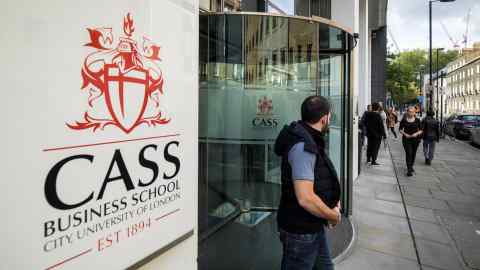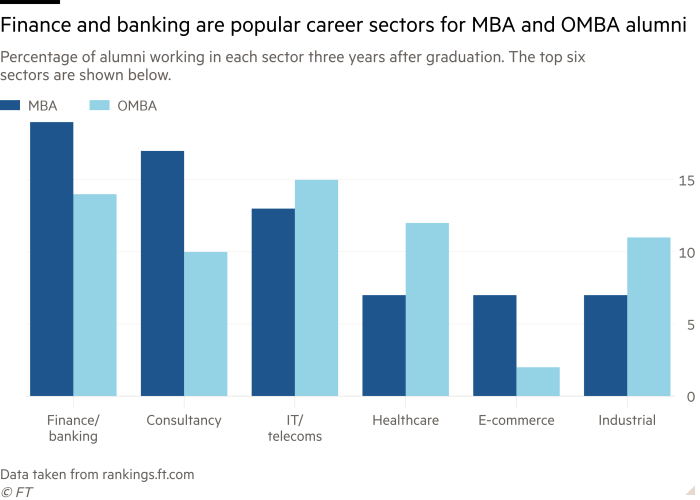Enterprise College Briefing: hot-desking CEOs, pupil variety, profession sectors

Welcome to the Business School Briefing. We offer insights from Andrew Hill and Jonathan Moules as well as the selection of the top stories that are read at business schools. Edited by Wai Kwen Chan and Andrew Jack.
Notice board
The next newsletter will be emailed on May 4th Tuesday due to a national holiday in the UK on May 3rd.
The Global Boardroom: 4-6 May 2021. Strategies for a world changed by the crisis
Register here for free and listen to live streaming discussions on climate change, M&A, supply chains, tourism, agriculture, labor markets, mental health, trade and geopolitics. Over 120 influential speakers including Antony Blinken, Secretary of State, David Malpass, President of the World Bank, Melinda Gates, Co-Chair and Trustee of the Bill & Melinda Gates Foundation, and Sebastián Piñera, President of Chile.
Andrew Hills Management Challenge
Noel Quinn, the managing director of HSBC, is scrapping the executive board of the bank’s London headquarters and moving himself and his executives to an open “hot-desking” area as part of the group’s flexible work schedule.
Recommended
For my Management challengeI would like to know more about the pros and cons of having the CEO among his employees. I’ve covered a few in my column this week. Send your pros and cons, ideally from your own experience, to [email protected].
Thank you for your responses to last week’s challenge – to point out useful lessons businesses can learn from the sport. Steve Thomas (@stevethomasesq) on Twitter insisted that there were no such lessons: “Businesses need to learn from other places. Like … communities, the public sector, feminism, and science.” However, Christopher Kayes offered these lessons: “Research shows that constant performance pays better than peak performance. Stress reduces performance. So learn how to minimize stress. Resilience results from continuous improvement, even if you make slow progress . “
Recommended

in the further readingIt was hard to ignore the ramifications of Adam Grant’s article for the New York Times in which he captured the low level of boredom experienced by many this year, saying, “It wasn’t burnout – we still had it Energy. It wasn’t depression – we didn’t feel hopeless. We just felt a little joyless and aimless. It turns out there is a name for it: languishing. “
Jonathan Moules’ messages from the business school
This week I broke the news that City, University of London, was renaming its business school in honor of 18th century statistician Thomas Bayes, ending a 20 year partnership with 17th century slave manager Sir John Cass becomes. City is also setting up a £ 5 million scholarship fund, which is equal to the money she received from Cass’s Education Foundation in 2001 to pay fees for black UK residents seeking a place on a business degree receive.
Recommended

The Oxford Foundry, the university’s entrepreneurship center founded with help from Said Business School, also seeks to promote greater diversity in business education. It is launching an Entrepreneurial Fellowship Initiative to fund eight-week summer internships for 20 black, Asian, and ethnic minority (BAME) students with some of Foundry’s high-growth startups.
While visiting the UK, new research from Quacquarelli Symonds, the higher education think tank and compiler of the QS World University Rankings, found that the successful introduction of vaccines in the UK is making the country more attractive to international students. In a survey of 105,083 prospective students, 47 percent said the UK is becoming more attractive as a study target due to the success of its Covid-19 vaccination strategy, which according to the FT’s vaccine tracker now includes more than two-thirds of its students, is now getting a first population Protective dose.
Recommended

Demand for business masters degrees has been strong in the last year of coronavirus-related turmoil, but the varied responses to the global crisis shape where those who want to apply for a business school apply. A survey of 1,281 potential students by education research firm Carrington Crisp and accreditation body EFMD found that 28 percent had dropped out of a Masters degree in certain countries due to the government’s ability to respond to the pandemic.
For further reading this week, I recommend this piece by Lynda Gratton of the London Business School in the Harvard Business Review on How to Do Hybrid Work Properly: Something We All (Hopefully) Learn in the Coming Months of the Covid-19 Lockdown Easing have to.
Data line
Finance / banking, consulting, and IT / telecommunications remain the most popular career goals for MBA and online MBA graduates surveyed for the FT MBA and OMBA rankings, says Leo Cremonezi.
Interest in advice has increased over the past five years. Full-time MBA students are typically in their late twenties and may be looking for work experience in these top three sectors. Online MBA students are more likely to be in their mid-30s and more established in their industries.

Top business school reads
The Super League plan collapses as more clubs Inter Milan and Atlético Madrid are eliminated and together with the English soccer teams end the breakaway competition
Derek Chauvin, convicted of the murder of George Floyd Biden, welcomes the former police officer’s verdict as a potential “big step forward” in the fight against injustice
Vaccines Work: Charts That Show Covid’s Endgame Although infections are at record highs, lives are being saved in countries with effective vaccination programs
How well do you know the news?
Answer our 10-question quiz.
Previous editions
To view previous newsletters, go to: ft.com/bschool.
If you are an FT subscriber and this email has been forwarded to you, you can sign up for the FT Business School Briefing.
